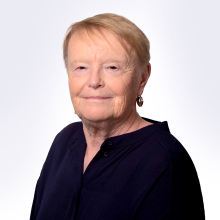Dr. Claudia A. Mitchell
Academic title(s):
Distinguished James McGill Professor | Director, Participatory Cultures Lab | Director, The Institute for Human Development and Well-Being (IHDW)

Group:
Institute Director
Division:
Educational Leadership Supervisors
Educational Studies (Ph.D.) Supervisors
Education and Society Supervisors
Department:
Department of Integrated Studies in Education (DISE)
Professional activities:
- Editor-in-Chief and Founding Editor, Girlhood Studies: An Interdisciplinary Journal
- Associate Member, School for Population and Global Health
Area(s):
Arts, Languages and Literacy Education
Social Action and Sustainability Education
Teacher Education, Pedagogy and Leadership
Areas of expertise:
- Participatory Visual Methodologies
- Girlhood Studies
- Youth Engagement
- Sexual and Gender Based Violence
- Sexual and Reproductive Health Rights
- Gender Equity
- Gender Transformation
- International and Global Communities
- Literacies
Biography:
Claudia Mitchell is a Distinguished James McGill Professor in the Faculty of Education, McGill University and an Honorary Professor at the University of KwaZulu-Natal, South Africa. At McGill she is the director of the Institute for Human Development and Well-being and the founder and director of the Participatory Cultures Lab, a research and training unit in the Faculty of Education funded through the Canadian Foundation for Innovation (CFI). Her research focuses on participatory visual and arts-based approaches to working with young people and communities in relation to addressing critical social issues such as gender equality and gender-based violence and in a wide range of country contexts in West Africa, Southern and Eastern Africa, and East Asia Pacific. She is the Editor-in-Chief of Girlhood Studies: An Interdisciplinary Journal.
Degree(s):
- Ph. D, Elementary Education, University of Alberta, Canada
- M.A., Education (Reading), Mount Saint Vincent University, Canada
- B.A., Sociology, Brandon University, Canada
Prizes and Awards:
Royal Society of Canada (Member/Fellow)
Distinguished James McGill Professor
Awards, honours, and fellowships:
-
2023 Arts Researcher Life-time Achievement Award, Canadian Society for Studies in Education
-
2022 The José Vasconcelos World Culture Council
-
2021 Government of Canada’s Women of Impact in Canada inductee
-
2019 Prix de Quebec (Leon-Gerin Laureate)
-
2016 SSHRC Gold Medal Award
Selected publications:
- Mitchell, C., Giritli-Nygren K. & Moletsane, R. (2024). Where am I in the picture? Positionality in rural studies. Toronto: University of Toronto Press.
- Mitchell, C. & Smith, A. (Eds) (2023). The girl in the pandemic. New York: Berghahn Press.
- Denov, M., Mitchell, C. &Rabiau, M (2023). Global child: Children and families affected by war, displacement and migration. New Brunswick, N.J.: Rutgers University Press.
- Mitchell, C., Yamile, N., D’Amico, M., Linds, W., & Denov, M. (2023). On the ethics of getting the word out: Rural girls reflect on ownership in participatory Visual research in rural South Africa. YOUNG, 31(3), 250–267. https://doi.org/10.1177/11033088231166814
- Walsh, S. Mitchell, C. & Oliphant, M. (2022). In my life: Stories from young activists in South Africa 2002-2022.. Jacana Press.
- Mitchell, C., Lussier, K. & Keita, K. (2022) Youth agency in times of crisis: Exploring education and conflict in Mali through participatory visual approaches with youth. Frontiers in Education, DOI: 10.3389/feduc.2022.959225
Graduate supervision:
Taking new students during the upcoming application period: Masters Students and PhD Students
